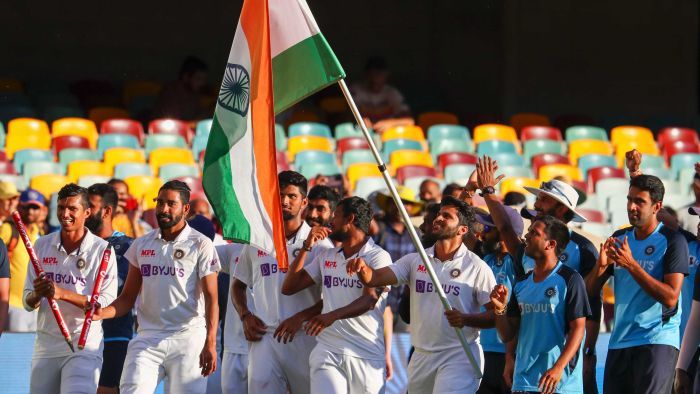In the history of cricket in Australia, the 1960–61 tour by the West Indies stands out like a beacon.
Australia won that five-match series 60 years ago 2-1, but the West Indies captured the hearts and minds of the country.
The tour was unique in so many ways, not least that it was the first West Indian team to be captained by a black man, Frank Worrell, but also for the enormous goodwill that emerged between the two sides.
At least 90,000 spectators turned up for the first day of the fifth Test.
After Australia won it by two wickets, Worrell presented Australian captain Richie Benaud with his cap, tie and blazer, along with the comments “I give Richie my scalp, my neck and my body”.
Thousands of spectators below the balcony of the MCG members broke into For He’s a Jolly Good Fellow.
Loading…
Days later, tens of thousands of Melbournians lined the city streets 10-deep as the West Indies were given a motorcade send-off for a series that was said to have rescued cricket.
Worrell later said “the traffic was literally stopped…people were to be seen lining the streets, leaning out of windows three or four storeys up”.
“They Lost the Series — But They Won Australia” read the Daily Telegraph’s front-page headline on the report of the motorcade.
Sixty years later, in these strange COVID times, how different is it for an Indian team — that has risen above all barriers to win the Test series 2-1 — which will quietly slip out of the country today with little fanfare.
It seems wrong for a team that has pulled off what Sambit Bal writing for Cricinfo called “the greatest moment in India’s Test history” by retaining the Border-Gavaskar Trophy.
Just imagine the send-off they would have received in a COVID-free world if they could have been driven in open-top cars through the streets of Sydney or Melbourne with their huge Indian populations of adoring fans.
At least they got a lap of honour in front of a scattered but raucous crowd of supporters at the Gabba to soak up the significance of their stunning three-wicket win and series comeback, after getting rolled for just 36 runs to lose the first Test in Adelaide.
It’s fitting that Brisbane was the venue for their extraordinary series win, the same venue that hosted the famous tied Test between the West Indies and Australia on that historic tour 60 years ago.
And how fitting that India’s stand-in captain, Ajinkya Rahane, presented Nathan Lyon with a jersey signed by the Indian team to mark his 100th Test, in a gesture that harked back to Worrell’s gift to Benaud.
It was a gracious act by a gracious team — one that differs in so many ways from those that have come before.
Indian teams loaded with superstars like Sachin Tendulkar, MS Dhoni, Rahul Dravid, VVS Laxman, Anil Kumble, Sourav Ganguly and Harbhajan Singh have come to this country and failed.
This side came back against all odds without the one player who sits in the same pantheon of those former Indian greats, captain Virat Kohli.
Those sides from the early 2000s played with a feistiness. They were the new India, no longer bound by their colonial past.
This side stands on their shoulders without the need to prove anything beyond their ability and grittiness on the cricket field.




And they do so with confidence and youth — a reflection of modern India and modern times.
Mohammed Siraj called out racist comments in just his second Test match, an act hard to imagine in years gone by.
“A new India emerged Down Under — resilient and ambitious” Ashutosh Sharma wrote in India’s Outlook magazine.
“This was arguably India’s greatest Test win overseas and definitely their finest series victory ever,” wrote Partha Bhaduri in the Times of India.
“They believed, obstinately and vehemently.”
“Young India is showing is showing they are not afraid,” said former captain and Indian Test legend Sunil Gavaskar.
This side won the trophy named in Gavaskar’s honour along with Australia’s Allan Border with an astonishing mix of skill, tenacity, courage and yes, belief.




It’s at times like these that superlatives flow and yet they don’t seem to do justice to explain what we all witnessed — a so-called second-string side coming back from an embarrassing defeat and suffering a shocking series of injuries to beat one of the strongest sides in world cricket on their home soil during a global pandemic.
Just three players from that losing first Test side played in the Brisbane Test and only two, Rahane and the mighty warrior Cheteshwar Pujara, played in all four.
They won without six of their first-choice bowlers — the attack went into the fourth Test with just four matches and 11 wickets between them.
It’s been asked before, but worth repeating: how would an Australian side fare in India without Steve Smith, Mitchell Starc, Pat Cummins, Josh Hazelwood and Lyon?
Those players and the rest of the Australian team will now have to lick their wounds as they prepare for a tour of South Africa and find a means to regain their mojo.
But this isn’t their time.
This time belongs to India, a team that has created one of the great Test series that will live in the memory like the West Indies in 1960-61.
They deserve a motorcade.







